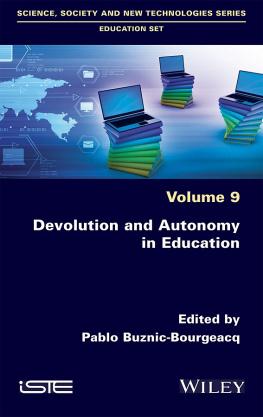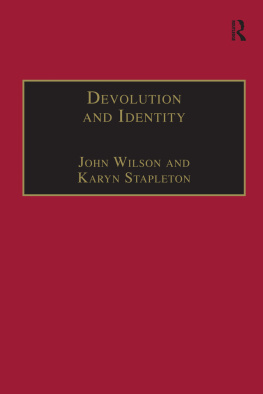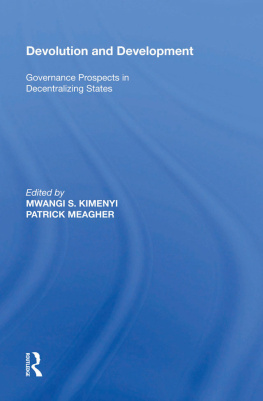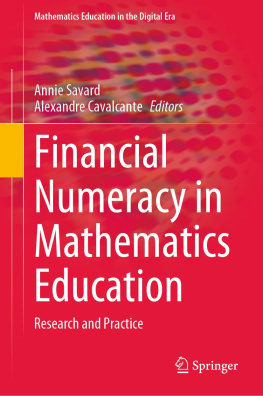
Education Set
coordinated by Angela Barthes and Anne-Laure Le Guern
Volume 9
Devolution and Autonomy in Education
Edited by
Pablo Buznic-Bourgeacq

First published 2021 in Great Britain and the United States by ISTE Ltd and John Wiley & Sons, Inc.
Apart from any fair dealing for the purposes of research or private study, or criticism or review, as permitted under the Copyright, Designs and Patents Act 1988, this publication may only be reproduced, stored or transmitted, in any form or by any means, with the prior permission in writing of the publishers, or in the case of reprographic reproduction in accordance with the terms and licenses issued by the CLA. Enquiries concerning reproduction outside these terms should be sent to the publishers at the undermentioned address:
ISTE Ltd
27-37 St Georges Road
London SW19 4EU
UK
www.iste.co.uk
John Wiley & Sons, Inc.
111 River Street
Hoboken, NJ 07030
USA
www.wiley.com
ISTE Ltd 2021
The rights of Pablo Buznic-Bourgeacq to be identified as the author of this work have been asserted by him in accordance with the Copyright, Designs and Patents Act 1988.
Library of Congress Control Number: 2021936092
British Library Cataloguing-in-Publication
Data A CIP record for this book is available from the British Library
ISBN 978-1-78630-698-2
Foreword
The Devolution Process within the Framework of the Theory of Didactical Situations
The concept of devolution, introduced by Brousseau (1982), is at the heart of the theory of didactical situations in mathematics, which itself has called for some research observations in didactics of mathematics, particularly in France, since the 1970s. I will then come back to the concept of devolution, which leads us to introduce a fundamental distinction between situational knowledge and institutional knowledge and to characterize the process of devolution. We will then be able to question the roles of the teacher, as well as of the student before concluding on the implications for the disciplines.
Some observations on the didactics of mathematics and theory of didactical situations
The term didactics refers to many points of view that depend on the history of research communities in different disciplinary didactics. In didactics of mathematics, a broad anthropological point of view prevails (Sarrazy 2005), which is reflected, for example, in the following definitions:
[] the didactics of mathematics [is] the science of studying and helping to study (questions of) mathematics (Bosch and Chevallard 1999, p. 79).
It is the science of the specific conditions regarding the diffusion of mathematical knowledge necessary for human occupations (broad sense) (Brousseau 2003, p. 2).
Both of these definitions consider the didactics of mathematics a normal science (Kuhn 1970) that includes both foundational and applied research (International Council for Science 2004). Its object of study is specified, and it specifically concerns mathematics; however nothing refers to school or teaching, which represent institutional and historical choices concerning only part of the diffusion of mathematical knowledge or the study of it. In the continuation of the previous quotation, Brousseau, when he specifies the restricted meaning, indicates a teaching institution but assigns to it a meaning that is not necessarily that conferred on it by contemporary usage (employee in national education).
The didactics of mathematics deals (in a restricted sense) with the conditions where an institution considered a teaching institution attempts (mandated if necessary by another institution) to modify the knowledge of another taught institution when the latter is not able to do so autonomously and does not necessarily feel the need to do so. A didactic project is a social project to enable a subject or an institution to appropriate knowledge that has been or is in the process of being created. Teaching includes all the actions that seek to achieve this didactic project (Brousseau 2003, p. 2).
In this quotation, a very important point that will be developed is that the taught institution does not necessarily feel the need to change its knowledge and is not able to do so autonomously. As I am only interested here in one teaching institution, the school, I will speak of students and teachers.
The concept of devolution
Brousseau borrows the term devolution from legal vocabulary, formed from the Latin devolere (Medieval Latin), which means to roll up and down. In use today in political and administrative language, this expression is usually applied to the movement of transferring power from one jurisdiction, or even from the controlling authority, over the actions and resources associated with these responsibilities. Although inspired by the legal terminology applied to civil matters (law of succession), this concept used in the sphere of public affairs is generally used to refer to a topdown approach to subsidiarity, a subject that is now closely regulated in all rule of law regimes.
In his glossary, Guy Brousseau considers devolution a process that he defines as follows:
The process by which the teacher manages to place the student as a simple actant in adidactic situation []. In this way, the teacher seeks to ensure that the students action is produced and justified only by the needs of the milieu and by his or her knowledge, and not by the interpretation of the teachers didactic procedures. For the teacher, devolution consists not only of proposing a situation to the student that should provoke in him or her an activity that has not been agreed previously, but also in making him or her feel responsible for obtaining the proposed result, and in accepting the idea that the solution depends only on the exercise of the knowledge he or she already possesses. The student accepts responsibility under conditions that an adult would not accept, because if there is a problem and then knowledge is created, it is because there is doubt and ignorance first. This is why devolution creates responsibility, but not guilt in the event of failure (see paradox of devolution). Devolution is the counterpart to institutionalization. These are the two didactic interventions of the teacher in the pupil milieu knowledge situation. It is an important sui generis element of the didactic contract (Brousseau 2003, p. 5).
He completes this definition in the article le paradoxe de la dvolution:
The teacher has a social obligation to teach everything necessary about knowledge. The student especially when he or she is failing asks the teacher to do so. So the more the teacher gives in to these requests and reveals what he or she wants, the more precisely the teacher tells the student what he or she needs to do, the more likely the student is to lose his or her chances of obtaining and objectively observing the learning that he or she is actually trying to achieve. This is the first paradox: it is not quite a contradiction, but knowledge and the project of teaching will have to advance behind a veil. This didactic contract thus puts the teacher before a real paradoxical injunction: everything he or she does to make the student produce the behaviors he or she expects, tends to deprive the latter of the conditions necessary for understanding and learning the targeted notion: if the teacher says what he or she wants, the student can no longer obtain it. However, the student is also faced with a paradoxical injunction: if he or she accepts that, according to the contract, the teacher teaches him or her the results, the student does not establish them himself or herself and therefore does not learn mathematics, does not master them. If, on the contrary, he or she refuses any information from the teacher, then the didactic relationship is broken. To learn implies, for him or her, that he or she accepts the didactic relationship but that he or she considers it provisional and tries to reject it (Brousseau 2003, p. 9).
Next page













